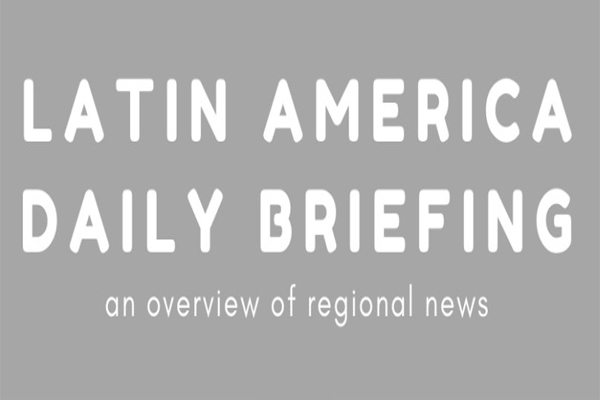

Argentina
- Argentina has pledged to boost oil and gas production and grain exports in response to global energy and food shortages, reports FT.
Brazil
- “Commentators who expect a 1960’s style military coup with tanks in the streets are preparing for the wrong crisis. (Bolsonaro) is aiming for an autogolpe, not a military coup, and with that Bolsonaro’s first weapons of choice will be rallies, lawyers, court battles, political arm wrestling, stretching the powers of the presidency, and breaking both the rules and norms by which he is supposed to abide,” writes James Bosworth at the Latin America Risk Report.
- “The best outcome would be for Mr Bolsonaro to lose by such a wide margin that he cannot plausibly claim to have won, either in the first round on October 2nd, or (more likely) in a run-off on October 30th. It will be a tense, dangerous few weeks. Other countries should publicly support Brazilian democracy, and quietly make clear to the Brazilian military that anything resembling a coup would make Brazil a pariah. Brazilian voters should resist the pull of a shameless populist,” argues The Economist.
Chile
- Chilean students protested on Wednesday in support of reforms to the country’s education system, reports Reuters.
- Although Chile’s rejection of the proposed constitution on Sunday offers the opportunity of a more moderate rewrite, increasing political polarization in the country poses a risk, writes Oliver Steunkel at Carnegie Endowment for International Peace.
Colombia
- Although President Gustavo Petro has suggested that Colombia may halt extraditions to the US for drug trafficking cases in which individuals cooperate with law enforcement, the government approved on Wednesday the extradition of Alvaro Fredy Cordoba, the brother of Pacto Histórico senator Piedad Cordoba, reports Reuters.
Guatemala
- “The shuttering of Guatemala’s peace institutions has been coupled with attacks on judicial independence and rule of law in order to serve the interests of illicit networks. Over the past year, more than two dozen judges, magistrates and prosecutors have fled Guatemala after defamation campaigns, threats, and efforts to criminalize them through spurious lawsuits. High-risk court judges who have convicted war criminals (as well as government officials charged with high-level corruption) have been criminalized and some removed from their posts,” writes Jo-Marie Burt at The Leuven Transitional Justice Blog.
Haiti
- Violence broke out during protests and at least one individual died on Wednesday, with protestors demanding “safer streets, more affordable goods and the resignation of Prime Minister Ariel Henry.” (ABC News, Top Daily News)
Mexico
- “President Andrés Manuel López Obrador’s proposal to place Mexico’s National Guard under full military control, which comes before the Senate today, would deepen and make permanent a model that has failed to improve security for over 15 years. The Senate should reject this unconstitutional attempt to eliminate the last vestige of civilian federal police and to transfer yet more roles to the military,” says WOLA.
- “López Obrador’s administration, it seems, wants to make discretionary use of power and resources, and opts for short-term benefits over long-term gains. With the opposition weakened, it is up to citizens to oppose a failed security policy that delivers neither safety, transparency nor human rights protection. Mexicans could demand, for example, that priority be given to civilian police reform—particularly improved training, working conditions and use-of-force oversight mechanisms—and to the creation of a truly autonomous public prosecutor’s office,” writes Sonja Wolf at Americas Quarterly, arguing that a militarized security approach has not worked.
- The opposition coalition Va por México, composed of the PAN, PRI, and PRD, has been broken due to the PRI’s support for “expanding the presence of the military in public security activities,” reports Reforma.
- The Los Angeles Times explores the consumption of grasshoppers in Mexico and the growing market for the high-protein insect, telling the stories of grasshopper hunters and noting that some individuals “are working on a protocol to help the government regulate the industry.” (Editor’s note: grasshoppers are delicious!)
Nicaragua
- “According to Nicaragua’s Finance and Public Credit Minister Ivan Acosta, Russia’s MIR card payment system is of interest to the nation,” notes Euro Weekly News.
- “The United States has so far responded to Nicaragua’s downward spiral with a shrug, emboldening the regime,” writes Eric Farnsworth at Univision, arguing, “At no time this century has democracy been at greater risk in the Americas; Nicaragua has already crossed the threshold to dictatorship. Refusing to give the problem the political level attention it deserves only makes matters worse. The Nicaraguan people deserve better, and the United States and the international community must now do more to help.”
Paraguay
- “Paraguayan investigators searched for clues Wednesday in the killing of a journalist in the northern end of the country, while prosecutors disputed accusations that law enforcement officials failed to protect the victim,” reports AP.
Peru
- A new IDEA analysis exploring Peruvian election data from 2001-2021 argues that “the abnormal behaviors presented as evidence of alleged electoral fraud are not uncommon in presidential elections” in the country and do not serve as evidence of systematic fraud during the 2021 election.
Regional
- OCCRP has just published a “free Spanish-language handbook (containing) tools, instructions, and tips on how to find and consult available records and databases in 19 Latin American countries, as well as in the United States, Belize, and the British Virgin Islands, which are prime havens for stolen money from the region.” You can access it here.
- “One in every three ransomware attacks targets a Latin American country. In 2020, cybersecurity provider Kaspersky registered an average of 5,000 ransomware attacks per day against targets in Latin America,” write Steph Shample and Bryan Ch. Campbell in Global Americans, arguing that “With a few exceptions, legislative efforts to prepare the region for the threat posed by cyber incidents have been reactionary and insufficient in nature.”
Venezuela
- A new Equilibrium CenDE survey in Venezuela finds that 49% of respondents reported viewing the country’s human rights situation as worsening in the last 5 years. Just 9% said that human rights have become more respected.
- Despite President Nicolás Maduro’s claims, digital censorship exists in Venezuela, reports Efecto Cocuyo.
- “In Maracaibo, the once wealthy Venezuelan oil city, two innovators are trying to push a new trend: small electric and solar-powered cars that offer an alternative for people fed up with regular fuel shortages and long lines at the gas station,” reports Reuters.
Arianna Kohan y Jordi Amaral / Latin America Daily Briefing
http://latinamericadailybriefing.blogspot












